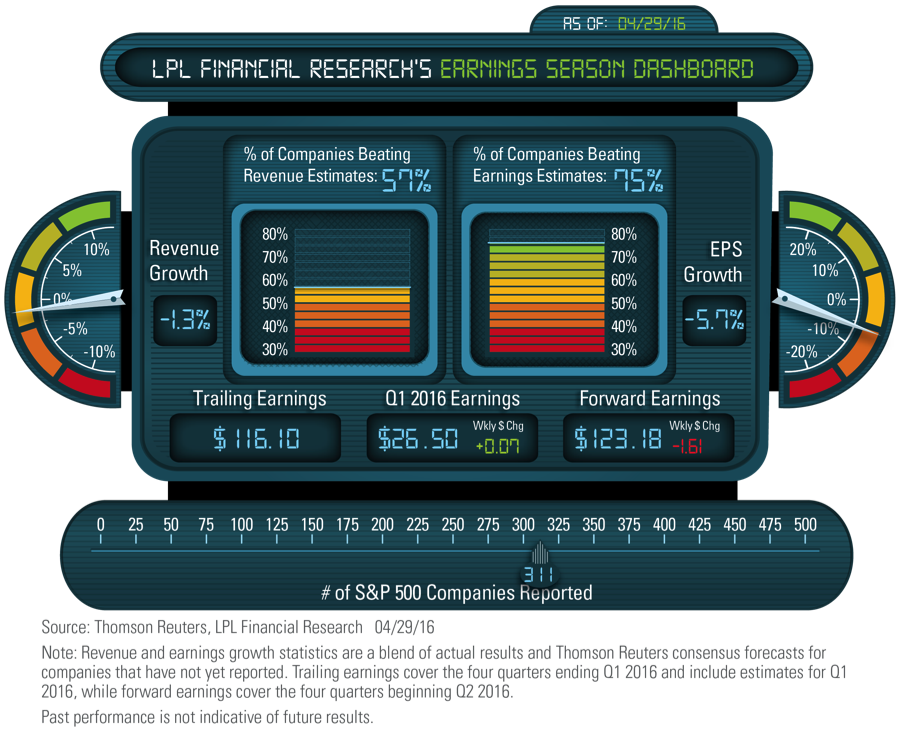- U.S., Europe tracking higher; Asia finishes down.Stocks in the U.S. and Europe are moving higher in Monday trading as they look to rebound after posting losses on Friday. This comes as oil moves off overnight lows and despite a sell-off in Asian securities. The sell-off was led by a 3.1% tumble in Japan’s Nikkei Index, which fell as the yen rose to 18-month highs. Disappointing manufacturing data out of China also weighed on sentiment, although losses were modest on the Shanghai Composite. Meanwhile, COMEX gold is above $1300/oz., a level not seen in more than a year, and the yield on 10-year Treasuries continues to move sideways after finishing last week at 1.83%.
- With nearly two-thirds of S&P 500 companies having reported, Q1 2016 earnings numbers are somewhat encouraging versus expectations. S&P 500 earnings for Q1 are tracking to a 5.7% decline, about 2% ahead of estimates when earnings season began (Thomson data). Consumer discretionary, industrials, and materials have produced the biggest upside relative to prior estimates, while energy, financials, and utilities have missed by most. After a slow start, earnings are on track to deliver a 3-5% upside, consistent with the historical pattern, and marginal year-over-year growth excluding the energy sector. This week 124 S&P 500 companies report results.
- Earnings revisions provide a small victory. Overall, we consider the modest downward revisions to S&P 500 earnings estimates for the balance of the year a small victory. Excluding the technology sector, among this season’s disappointments, Q2 2016 (current quarter) estimates would have actually risen since earnings season began, a rare accomplishment. A weaker U.S. dollar has helped, while higher oil prices have not–the energy sector’s earnings estimate for Q2 has been revised down by 2%. Industrials and financials have seen the biggest increases in Q2 estimates, although both sectors have seen Q3 estimates fall.
- It’s jobs week. The April employment report (Friday, May 6) highlights the week’s economic and policy calendar, although the April readings on vehicle sales and Institute for Supply Management (ISM) will get plenty of attention. There are 15 Federal Reserve Bank (Fed) officials slated to speak this week, highlighted by New York Fed President Bill Dudley either today or tomorrow. It’s relatively quiet overseas this week, with China releasing its April data set starting at the end of the week. Please see our Weekly Global Economic and Policy Calendar for details.
- The impact of oil on the consumer in this week’sWeekly Economic Commentary. Some market observers are suggesting that consumers will get crunched now that WTI crude oil prices have moved off multiyear lows. We examine what consumers did with their nearly $200 billion windfall from falling oil prices and what they might do next in this week’s Weekly Economic Commentary, due out later today.
- Sell in May, with a couple twists, in this week’s Weekly Market Commentary. May is upon us, which every year sparks a barrage of Wall Street commentaries and investor questions about the popular stock market adage “sell in May and go away.” In this week’s Weekly Market Commentary (due out later today), we tackle this widely cited seasonal pattern, with a couple of twists.
Macro View

Monitoring the Week Ahead
Monday:
- ISM Mfg. (Apr)
- ECB’s Draghi Speaks in Frankfurt
- China: Caixin Mfg. PMI (Apr)
Tuesday:
- Vehicle Sales (Apr)
- Mester (Hawk)
Wednesday:
- ADP Employment (Apr)
- ISM Non-Mfg. (Apr)
- Productivity (Q1)
Thursday:
- Bullard (Hawk)
Friday:
- Employment Report (Apr)
Saturday
- Employment Report (Apr)
Click Here for our detailed Weekly Economic Calendar
Important Disclosures
The economic forecasts set forth in the presentation may not develop as predicted.
The opinions voiced in this material are for general information only and are not intended to provide or be construed as providing specific investment advice or recommendations for any individual security. All performance referenced is historical and is no guarantee of future results. All indices are unmanaged and cannot be invested into directly.
Stock investing involves risk including loss of principal.
Investing in foreign and emerging markets securities involves special additional risks. These risks include, but are not limited to, currency risk, political risk, and risk associated with varying accounting standards. Investing in emerging markets may accentuate these risks.
Treasury inflation-protected securities (TIPS) help eliminate inflation risk to your portfolio, as the principal is adjusted semiannually for inflation based on the Consumer Price Index (CPI)—while providing a real rate of return guaranteed by the U.S. government. However, a few things you need to be aware of is that the CPI might not accurately match the general inflation rate; so the principal balance on TIPS may not keep pace with the actual rate of inflation. The real interest yields on TIPS may rise, especially if there is a sharp spike in interest rates. If so, the rate of return on TIPS could lag behind other types of inflation-protected securities, like floating rate notes and T-bills. TIPs do not pay the inflation-adjusted balance until maturity, and the accrued principal on TIPS could decline, if there is deflation.
Bank loans are loans issued by below investment-grade companies for short-term funding purposes with higher yield than short-term debt and involve risk.
Because of its narrow focus, sector investing will be subject to greater volatility than investing more broadly across many sectors and companies.
Commodity-linked investments may be more volatile and less liquid than the underlying instruments or measures, and their value may be affected by the performance of the overall commodities baskets as well as weather, disease, and regulatory developments.
Government bonds and Treasury bills are guaranteed by the U.S. government as to the timely payment of principal and interest and, if held to maturity, offer a fixed rate of return and fixed principal value. However, the value of fund shares is not guaranteed and will fluctuate.
Investing in foreign and emerging markets debt securities involves special additional risks. These risks include, but are not limited to, currency risk, geopolitical and regulatory risk, and risk associated with varying settlement standards.
High-yield/junk bonds are not investment-grade securities, involve substantial risks, and generally should be part of the diversified portfolio of sophisticated investors.
Municipal bonds are subject to availability, price, and to market and interest rate risk if sold prior to maturity. Bond values will decline as interest rate rise. Interest income may be subject to the alternative minimum tax. Federally tax-free but other state and local taxes may apply.
Investing in real estate/REITs involves special risks such as potential illiquidity and may not be suitable for all investors. There is no assurance that the investment objectives of this program will be attained.
Currency risk is a form of risk that arises from the change in price of one currency against another. Whenever investors or companies have assets or business operations across national borders, they face currency risk if their positions are not hedged.
Technical Analysis is a methodology for evaluating securities based on statistics generated by market activity, such as past prices, volume and momentum, and is not intended to be used as the sole mechanism for trading decisions. Technical analysts do not attempt to measure a security’s intrinsic value, but instead use charts and other tools to identify patterns and trends. Technical analysis carries inherent risk, chief amongst which is that past performance is not indicative of future results. Technical Analysis should be used in conjunction with Fundamental Analysis within the decision making process and shall include but not be limited to the following considerations: investment thesis, suitability, expected time horizon, and operational factors, such as trading costs are examples.
This research material has been prepared by LPL Financial LLC.
To the extent you are receiving investment advice from a separately registered independent investment advisor, please note that LPL Financial LLC is not an affiliate of and makes no representation with respect to such entity.
Not FDIC/NCUA Insured | Not Bank/Credit Union Guaranteed | May Lose Value | Not Guaranteed by any Government Agency | Not a Bank/Credit Union Deposit
Securities and Advisory services offered through LPL Financial LLC, a Registered Investment Advisor
Member FINRA/SIPC
Tracking # 1-493262
